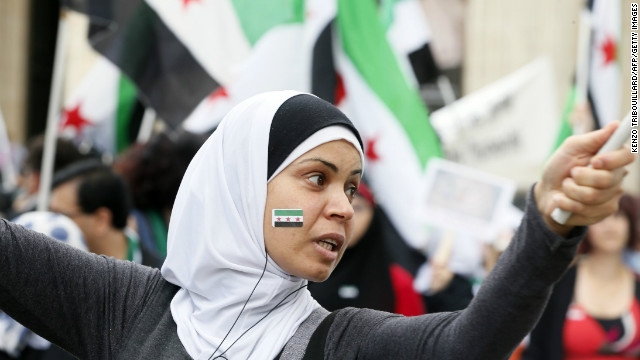Amid reports of increased gender-based violence against Syrian refugee women, and complaints that women have been sidelined in opposition politics and so have less say in how their futures will be shaped, several women’s groups say they are working to increase Syrian women’s involvement in the planned Geneva II “peace” conference next year.
Last month, Leila Hilal, director of the Middle East task force at the New America Foundation, put forward a number of ways in which women could be involved in peacemaking initiatives in Syria, including increasing their participation in any peace talks:
*Policymakers need to start with a gendered analysis of the situation: women and men experience conflict differently. Decisionmakers need to take those differences, and the political priorities they may give rise to, into account.
*International sponsors of peace talks should recognize the applicability of U.N. Security Council Resolution 1325 to the Syria conflict and work to ensure that women are adequately, honestly and collectively represented in any peace talks.
*Syrian strategists, policy experts on Syria and U.N. special representative on Syria Lakhdar Brahimi should all devote more time to studying and enabling local mediation inside Syria to explore strategies for de-escalating violence and increasing humanitarian access until a political settlement becomes possible.
*Donor countries, including the U.S., should lend more support to local councils and community-based organizations in Syria in which women have more presence and influence.
These recommendations come after the UN Security Council passed Resolution 2122 on Women, Peace and Security, which emphasized the need to address issues that have prevented the proper realization of a previous resolution, UNSCR 1325, which among other things sets out how the UN should implement its commitments on women, peace and security.
Dulcie Leimbach, writing for PassBlue, notes comments from Yasmine Ergas, director of the new gender and public policy specialization at Columbia’s School of International and Public Affairs, who said that, “In approving Resolution 2122, the Council declared its intention to focus more attention on women’s leadership and participation in conflict resolution and peacebuilding. It would be astonishing if negotiations intended to begin a peacebuilding process in Syria were now to exclude or only minimally involve women. Would that not fly in the face of the Security Council’s clearly stipulated policy of inclusion?”
So how are NGOs and women’s groups addressing these issues?
Leimbach notes several initiatives that aim to improve women’s participation in Syria’s political process, including in Geneva II (should that actually take place…).
Women on the Frontline, a new three-year initiative launched by the Netherlands-based international development group Hivos with a grant of €5.8 million from the Dutch Government, aims to work with Syrian women to improve their participation in the political process. The initiative will also work with women from other areas in the Middle East, including Egypt, Tunisia, Syria, Iraq, Bahrain, Yemen and Libya.
This Dutch program says that it will finance up to 30 women’s groups in MENA including three Syrian groups: the Syrian Women’s Network (SWN); the Syrian Women’s League (SWL); and Center for Civil Society and Democracy in Syria (CCSDS).
Meanwhile, the Women’s International League for Peace and Freedom is lobbying for women to be included in the Syria peace process via a petition on its website. The petition, which declares that “to date, Syrian women have not been included in the process, even though they are active, prepared and representative”, will be sent to Brahimi as well as foreign ministers, like United States Secretary of State John Kerry.
A third group pushing for women’s inclusion in Geneva II is Karama, an Arab organization whose aim is to end violence against women in the region. Karama wants the Syrian Women’s Forum for Peace to be present at Geneva.
Leimbach quotes one of Karama’s founders, Hibaaq Osman, a Karama founder, as saying that the group is holding regular meetings with people from Brahimi’s office. “They understand, however, that the effort must go beyond Brahimi, and Brahimi alone cannot push the government of Syria and/or the coalition to include women.”

